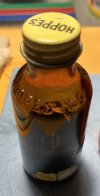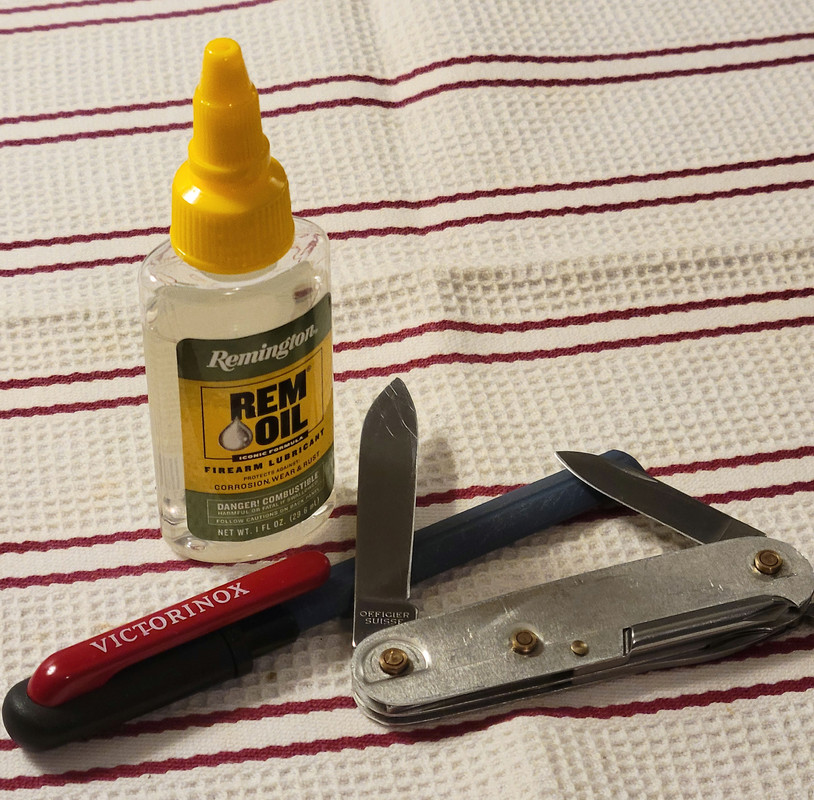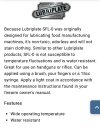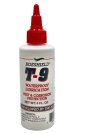-
The BladeForums.com 2024 Traditional Knife is available! Price is $250 ea (shipped within CONUS).
Order here: https://www.bladeforums.com/help/2024-traditional/
You are using an out of date browser. It may not display this or other websites correctly.
You should upgrade or use an alternative browser.
You should upgrade or use an alternative browser.
Ballistol vs Hoppes 9 vs RemOil
- Thread starter YetAnotherKnifeEnthusiast
- Start date
- Joined
- Jan 11, 2022
- Messages
- 246
I got the Ballistol in and I really like it. I really like that it's safe for skin.
RHINOKNIVES
Gold Member
- Joined
- May 6, 2000
- Messages
- 7,127
Hey! I just put a dab of Hoppes No 9 behind each ear! It drives the ladies wild! For knives I prefer liquid wax for folders. It doesn’t attract lint, dirt. Human grade mineral oil for carbon steel knives & especially cutting boards. Do not put olive oil on wood cutting boards. It can turn rancid & make you poop like a Goose…I make the wife daub it on like perfume on date night.
Last edited:
JJ_Colt45
Platinum Member
- Joined
- Sep 11, 2014
- Messages
- 6,732
Hoppe's, Lucas Oil, and Rem Oil primarily on guns with mineral oil on knives that may be in contact with food.
They should make candles that smell like Hoppe's to light in the fall to bring in hunting season to offset the pumpkin spice everything.
They should make candles that smell like Hoppe's to light in the fall to bring in hunting season to offset the pumpkin spice everything.
Jason B.
Knifemaker / Craftsman / Service Provider
- Joined
- Jun 13, 2007
- Messages
- 11,196
I have always considered Gun Lube to be terrible knife lube. Always gums up the action of the knife, imo.
I use Benchmade Blue lube on folding knives. Works wonders and lasts longer than most, also doesn't collect a lot of dust and dirt. Ive had the same bottle for about 15 years but, it works so well its tough to beat. For my Autos I use Clipper Oil, seems to be light enough to keep the action smooth and not sticky.
I used Lucas (the blue stuff) on my guns for a long time but have recently switched to Slip 2000. I dont get to shoot my rifle a lot so I dont know if i will like the Slip 2000 on that but for my pistols it has been great. I have Glock performance triggers in all my Glocks and it it instantly made them smoother and less likely to get gritty after a few hundred rounds. Haven't tried it on knives yet
I use Benchmade Blue lube on folding knives. Works wonders and lasts longer than most, also doesn't collect a lot of dust and dirt. Ive had the same bottle for about 15 years but, it works so well its tough to beat. For my Autos I use Clipper Oil, seems to be light enough to keep the action smooth and not sticky.
I used Lucas (the blue stuff) on my guns for a long time but have recently switched to Slip 2000. I dont get to shoot my rifle a lot so I dont know if i will like the Slip 2000 on that but for my pistols it has been great. I have Glock performance triggers in all my Glocks and it it instantly made them smoother and less likely to get gritty after a few hundred rounds. Haven't tried it on knives yet
SharpBits
Gold Member
- Joined
- Apr 26, 2002
- Messages
- 5,824
I have used Slip 2000 on knives. Seems to work well and I have no complaints.Haven't tried it on knives yet
Jason B.
Knifemaker / Craftsman / Service Provider
- Joined
- Jun 13, 2007
- Messages
- 11,196
I believe it was hoppes that I had used that really slowed down the action, 3-in-1 and miniral oil can be even worse. The Lucas extreme was a bit better but nothing like the blue lube, blue lube is just thinner and smoother. I have used lots of oils to lubricate knives, I stick with the blue lube because I have yet to find better for a folding knifes action. Im open to try other oils but gun or car oils ain't it for me.Where in the world are people getting that gun oil will gum up the joints of a knife? That's not accurate at all in my experience.
- Joined
- Mar 8, 2008
- Messages
- 26,122
In 3-in-1 it's seemingly the result of the small amount of citronella oil oxidizing and forming a varnish. Straight mineral oil is highly resistant to oxidative decomposition but can form varnishes over time from thermal and UV degradation.I believe it was hoppes that I had used that really slowed down the action, 3-in-1 and miniral oil can be even worse. The Lucas extreme was a bit better but nothing like the blue lube, blue lube is just thinner and smoother. I have used lots of oils to lubricate knives, I stick with the blue lube because I have yet to find better for a folding knifes action. Im open to try other oils but gun or car oils ain't it for me.
Boattale
Gold Member
- Joined
- Nov 27, 2019
- Messages
- 2,577
WD 40 when used without a wipedown will do that for sure.I've seen some old guns with old gummy oil. I don't see why that wouldn't happen on a knife.
Bill DeShivs
Knifemaker / Craftsman / Service Provider
- Joined
- Jun 6, 2000
- Messages
- 12,756
WD 40 is no worse than any other oil for varnishing-wiped or not.
- Joined
- Mar 8, 2008
- Messages
- 26,122
That's because WD-40 is basically mineral oil with hydrocarbon solvents of a few different grades in it and ~1% surfactant and a little fragrance/colorant.
The range of the hydrocarbons used is very broad and word is that it's because WD-40 Co. will vary the composition depending on supply chain price fluctuation. It's likely that between the broad range stated in the SDS and those source variations, the degree of refinement and impurity removal/isolation is fairly low. That is to say, the petrochemical fractions are probably a fairly "crude" stage of refinement, and this probably is responsible for varnish formation. When used as a water displacer that's unlikely to cause issues, but letting it sit and evaporate in larger volume is more likely to lead to circumstances that form varnishes. Varnish formation is the plague of many industries, and the mechanisms and circumstances that cause it are as varied as there are forms of cancer, but a lot of it comes down to oxygen and heat.
The range of the hydrocarbons used is very broad and word is that it's because WD-40 Co. will vary the composition depending on supply chain price fluctuation. It's likely that between the broad range stated in the SDS and those source variations, the degree of refinement and impurity removal/isolation is fairly low. That is to say, the petrochemical fractions are probably a fairly "crude" stage of refinement, and this probably is responsible for varnish formation. When used as a water displacer that's unlikely to cause issues, but letting it sit and evaporate in larger volume is more likely to lead to circumstances that form varnishes. Varnish formation is the plague of many industries, and the mechanisms and circumstances that cause it are as varied as there are forms of cancer, but a lot of it comes down to oxygen and heat.




